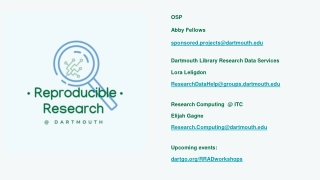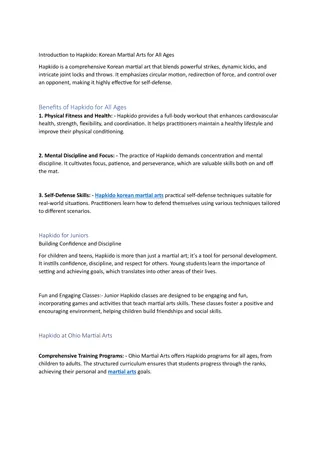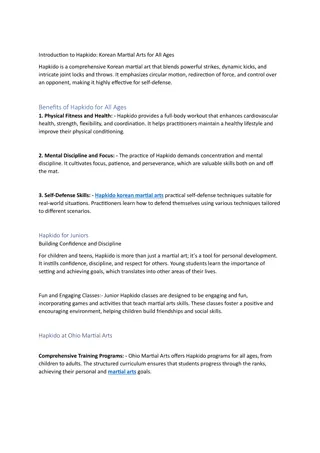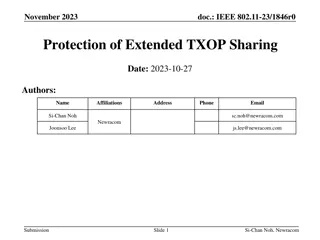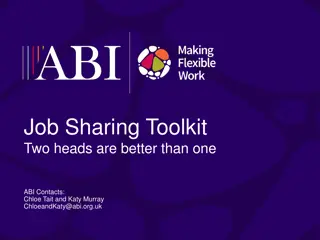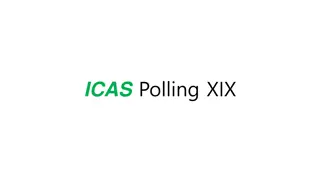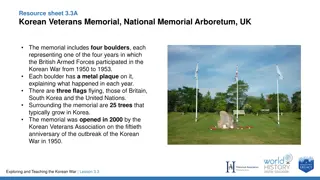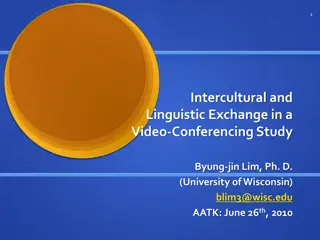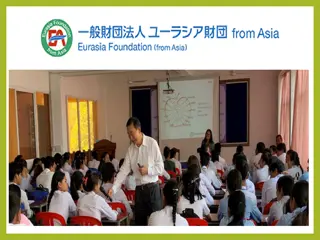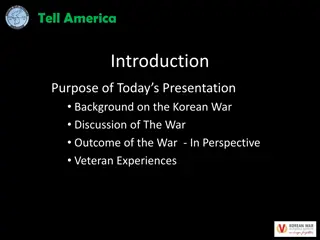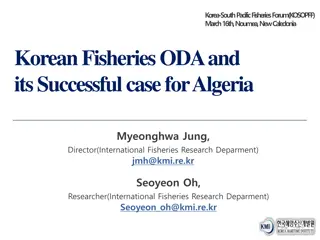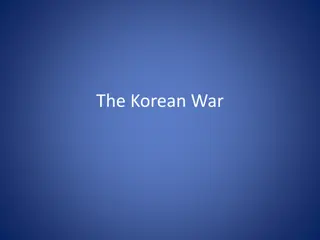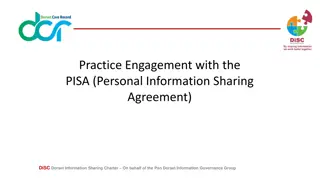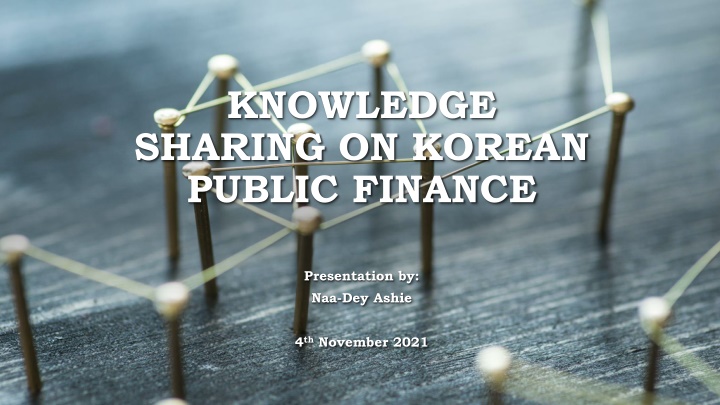
Insights into Korean Public Finance Training Program for Government Officials
Explore a detailed presentation on the Korean Public Finance Training Program by Naa-Dey Ashie, covering topics like medium-term planning, challenges in implementation, and the role of civil service. Learn about the objectives, participants, and scheduled activities aimed at enhancing government experts' capacities in finance and tax policy from various countries.
Download Presentation

Please find below an Image/Link to download the presentation.
The content on the website is provided AS IS for your information and personal use only. It may not be sold, licensed, or shared on other websites without obtaining consent from the author. If you encounter any issues during the download, it is possible that the publisher has removed the file from their server.
You are allowed to download the files provided on this website for personal or commercial use, subject to the condition that they are used lawfully. All files are the property of their respective owners.
The content on the website is provided AS IS for your information and personal use only. It may not be sold, licensed, or shared on other websites without obtaining consent from the author.
E N D
Presentation Transcript
KNOWLEDGE SHARING ON KOREAN PUBLIC FINANCE Presentation by: Naa-Dey Ashie 4thNovember 2021
OUTLINE Introduction (on Scholarship Program) Medium-Term Planning and Budgeting Korean Experience from the 1980s Medium-Term Expenditure Framework (MTEF) In Ghana Challenges in MTEF Implementation Role of the Civil Service in Enhancing MTEF in Ghana
Introduction KOICA Aim of KOICA partnerships with developing partners and enhance local ownership of beneficiaries among others through the implementation of Korea s grant aid and technical cooperation programs. Course Title Master s degree in Finance and Tax Policy Institution Korea University, Graduate School of International Studies (KU-GSIS) Course Duration 1st September 2019 to 25th February 2021 (17 months) Korea International Cooperation Agency to promote sustainable development, strengthen 3
Introduction - Objectives of the Scholarship Programme 01 02 03 Train government experts in the field of Finance and Tax Policy to enhance their capacities Develop human resources that will contribute to the socio-economic advancement of developing countries Enhance the understanding on Korean industries and corporate management system. 4
Introduction -Programme Participants Twenty (20) Government Officials from seventeen (17) countries in Africa, Asia and Latin America. Namely; Ghana, Kenya, Zimbabwe, Tanzania, Egypt,, East Timor, Indonesia, Philippines, Mongolia, Uzbekistan, Afghanistan, Pakistan, Nepal, Laos, Cambodia Nicaragua and Ecuador 5
Introduction - Scheduled Activities for Training Programmes Regular academic work Special lectures on Korean Public Finance and Tax Administration by field experts from the Korean Institute of Public Finance (KIPF) Field trip to Industrial sites Douzone Bizon Company Limited (IT solutions company providing support to the Korean National Tax Office in its tax administration) Training programmes by the Global Knowledge Exchange and Development Center (GKEDC) of the Korea Development Institute (KDI) understanding Korea s Economic Development and the Importance of Technical Vocational Education and Training (TVET) to International Development and Cooperation (IDC) Contribution of political will, dedicated human resource and effective data collection and management among others in South Korea s Industrial development 6
Medium-Term Planning and Budgeting Korean Experience from the 1980s Strong Leadership - The Planning Ministry (Economic Planning Board EPB) supervised the National Development Plan (Planning) and Multi-year Financial Plan (Budgeting). It was set up to oversee other ministries/agencies such as education, health, infrastructure. The 5-year National Development Plans were never followed rigorously: The plan was to ensure that society and its leaders understood the objectives and strategies to be carried out to achieve a common goal. Instead of following the plan blindly, it was understood that flexible adjustments would be made (during implementation) in which decisions would be informed/guided by the Medium-Term Fiscal Plan (MTFP) The MTFP was internal to the Central Budgeting Authority (EPB) and not released publicly. It was not reported to the legislature nor was the latter s review or approval required. The MTFP was developed by the EPB because they needed it, not because someone told the to. 7
Medium-Term Planning and Budgeting Korean Experience from the 1980s Cont d The MTFP was updated annually like MTEF but only for the period of the relevant 5- year Economic Development Plan (1962-66, 1967-71, 1972-76, 1977-81, 1982-86, 1987-91 and 1992-96). It was non-rolling/overlapping. Planning Period E.g., 4th EDP (1977-81): 1977 MTFP: ( 1977-1981) 1978 MTFP: ( 1978-1981) 1979 MTFP: ( 1979-1981) 1980 MTFP: ( 1980-1981) Plan 1977 1978 1979 1980 1981 4th 5yr EDP 1977 MTFP 1978 MTFP 1979 MTFP Therefore, the MTFP always matched the Economic Development Plan (EDP) 1980 MTFP 1981 MTFP 8
Medium-Term Planning and Budgeting Korean Experience from the 1980s Cont d The MTFP was an iterative process (making adjustments to both spending and revenue when they don t match) through increasing taxes, borrowing, etc.) Strategic funding prioritization - Examples Income tax exemption points and tax rate broadening the tax base, reducing income tax rate and reducing tax deductions /exemptions, and Tax relief for businesses reduce scope and rate of tax relief of businesses to bring product prices the market level. However, financial support will be provided to support Korean companies to maintain international competitiveness (to protect exports) Transfers to local governments Local government finance subsidies or direct subsidies will be reduced. Local Gov t revenue will be enhanced through increasing property tax Public enterprise support railway, electricity, coal prices will be adjusted to the market level and reduce financial support for public enterprises Investment resources for the education sector limit spending to capital spending, basic facilities for national and public schools. Get PTA to improve working conditions for teachers and staff members. SME support large SMEs funds should be sourced from the financial services sector (loans). Public finance should only be limited to infrastructure investment (e.g. Industrial complex, water supply, electricity supply, etc.) and technical guidance 9
Medium-Term Expenditure Framework (MTEF) In Ghana MTEF was introduced as a component of Public Financial Management Reform Program (PUFMARP) in 1995. Aim to ensure commitment of resources to planned policies and programmes and to promote fiscal discipline to address deficit issues. Moving from Activity Based Budgeting (ABB) to Program-Based Budgeting (PBB) in 2014. Objectives of PBB Ensure stronger linkage between public spending and determined results Ensure improved efficiency in the allocation and utilization of resources Focus on more strategic budget information in order to promote understanding and debate in parliament Improve the accuracy of budget information; and Shift the emphasis of budget management from activities and inputs oriented to results oriented 10
Challenges in MTEF Implementation Though massive progress has been made since the adoption of the MTEF, implementation is still challenged. Insufficient domestic revenue to fund budget implementation Poor costing of Medium-Term Development Plans Recurrent Budget is prepared on incremental bases (without evaluating whether some programs should be continued or not) Monitoring and evaluation constraints Poor coordination within and among implementing institutions 11
Role of the Civil Service in Enhancing MTEF Implementation in Ghana Enhance public trust in government through improved service delivery Improve ownership of sector planning and budgeting processes Prioritizing programmes in Medium-Term Development Plans and undertaking effective costing Improving records management to inform plan and budget preparation Recurrent Budget is prepared on incremental bases (without evaluating whether some programs should be continued or not) Undertaking periodic monitoring and outcomes/impacts and the inform the development of subsequent plans or modification of existing plans Improve coordination within and among implementing institutions Enhance sensitization of the public on the role of government evaluation of programmes to determine Collaborate with agencies to enforce the implementation of regulations 12
MEDAASE THANK YOU 13


